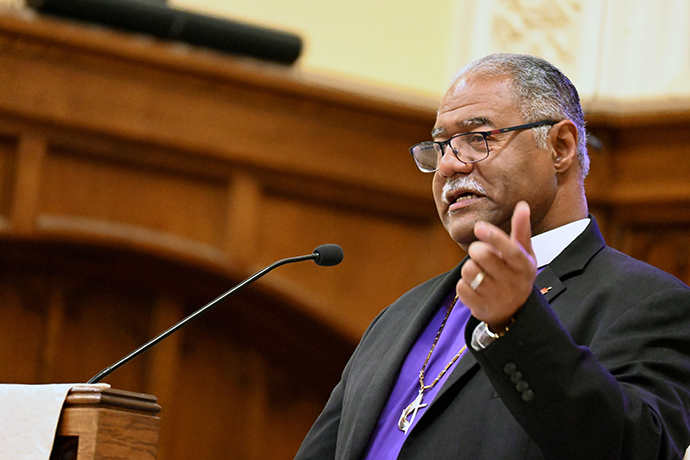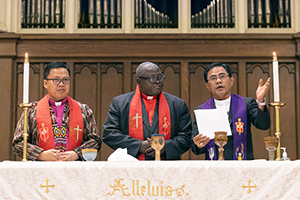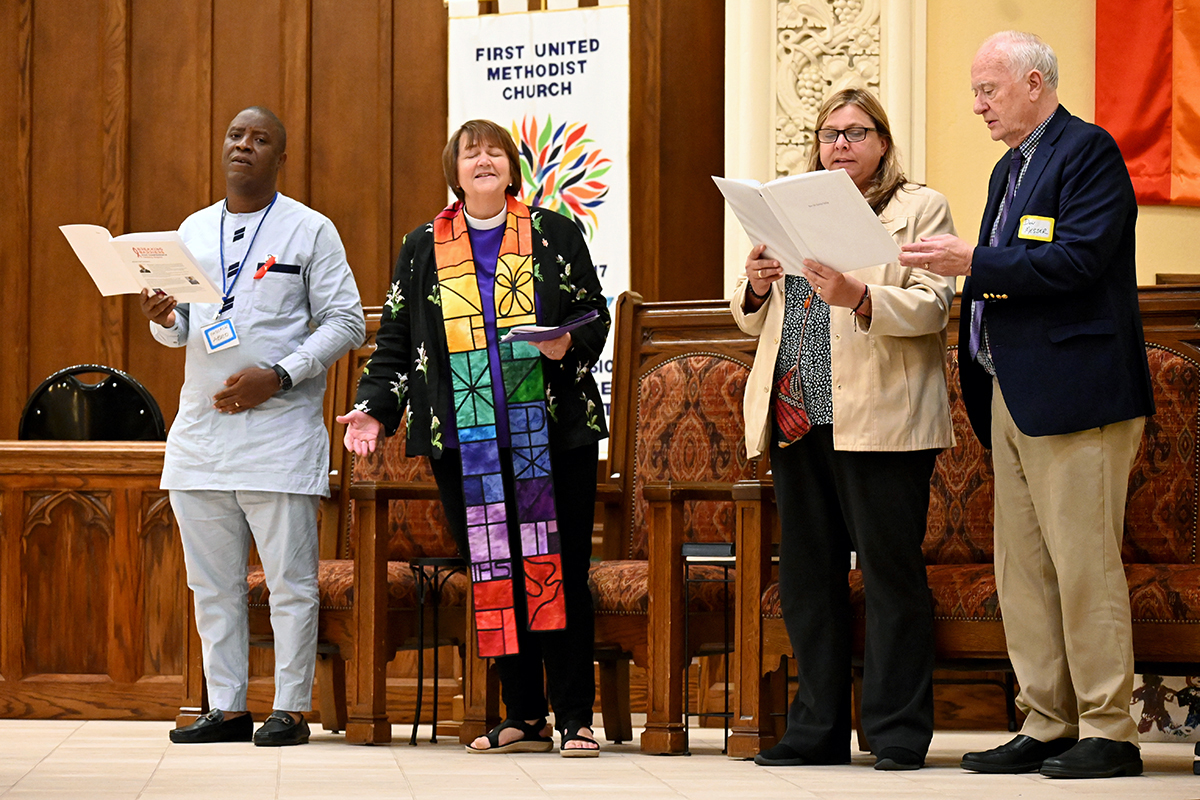Key points:
- The United Methodist Global AIDS Committee facilitated the daylong Breaking Barriers Conference as part of the run-up to the start of the denomination’s long-delayed General Conference.
- The Rev. Donald E. Messer, chair of the group’s executive committee, said that people of faith care about being in ministry with people living with HIV and AIDS.
- The day’s keynote speaker was Dr. Ulysses Burley III of Chicago, a medical doctor who was an AIDS adviser to President Obama.
United Methodists and friends gathered in the ornate sanctuary of First United Methodist Church on April 22 to get updates on an ongoing and important church issue: AIDS ministry.
Through worship, speakers, panels and workshops, the United Methodist Global AIDS Committee facilitated the daylong Breaking Barriers AIDS Conference as part of the run-up to the start of The United Methodist Church’s long-delayed General Conference.
More people are living longer with HIV — in many cases much longer — thanks to combinations of prescription drugs. Still, 39 million people were living with HIV worldwide in 2022, according to UNAIDS, and 630,000 people died from AIDS-related illnesses that year.
“It’s still an issue, and I’m glad to see there is still an interest in it,” said host pastor the Rev. Val Rosenquist of First United Methodist Church.
In her welcome, the Rev. Sunny Farley, Global AIDS Committee coordinator, said, “We pray we will all celebrate together in an AIDS-free world.”
The Rev. Donald E. Messer, chair of the group’s executive committee, said that “people are here because they care, and they have cared for many years.”
The keynote speaker was Dr. Ulysses Burley III of Chicago, an Evangelical Lutheran Church in America member and medical doctor who was an AIDS adviser to President Obama. He is also the founder of UBtheCURE, a nonprofit dealing with the convergence of faith, health care and human rights.
After describing how his life and career focus changed from cancer research to HIV and AIDS care, he said that he came to the realization that he wanted to cure poverty, stigma and disenfranchisement.
“Everyone has a story of pain and trauma,” Burley said. “I realized that social circumstances made people sick. No matter what I did for people’s care, I had to send them back out into the world that made them sick.”

Burley mentioned the four “S’s” that his organization is focusing on: science, social justice, spiritual or sacred, and stigma. He began a litany of statistics with the statement that AIDS is the fifth deadliest pandemic in human history — and if current trends continue, will soon be the fourth worst.
In the U.S., there are currently 1.2 million people living with HIV, with 87% knowing their status. That 13% who do not know their status are the loophole in stopping the spread of the disease, Burley said, because if they could be diagnosed and brought into treatment, then transmission could be prevented. Most of the total number of patients are under age 35, and more than half live in the South. Men comprise 80% of the total, and 70% identify as gay or bisexual. Blacks and Latinos are disproportionally represented, Burley added.
A treatment drug called ACT was approved in 1989, he said, but for most patients the side effects were worse than having HIV. Combination therapies, of which there are now more than 40, changed the treatment landscape. The drug called PrEP is one example. If taken daily, it can prevent transmission through sexual contact. Today patients can become undetectable, meaning that HIV levels are so low in their body that they are not able to transmit the virus.

General Conference photos
Burley said that work on a vaccine has been underway for more than 30 years. So far it’s been unsuccessful, but lessons learned did help speed the creation and success of the COVID-19 vaccine.
Burley concluded that all the treatment success doesn’t matter if we fail to address the stigma.
“It’s a human rights issue, a justice issue, a poverty issue, a food security issue, a gender equality issue, an incarceration issue and a discrimination issue,” he said. “You can’t have a conversation about stigma without communities of faith.”
In his homily for opening worship, Bishop Julius C. Trimble of the Indiana Conference — who has served as chair of the Global AIDS Committee since 2015 — said that the group’s main focus today was to attack the stigma of HIV and AIDS, along with spreading awareness about prevention and making treatment accessible.
Subscribe to our
e-newsletter
“There is no breaking of barriers unless there are barrier-breakers,” said Trimble, who was also recently elected top executive of the United Methodist Board of Church and Society. He has long championed the church’s ministry with people living with HIV and AIDS.
Trimble talked about the life of Dr. Harold Brown Jr. of Indianapolis, who was tragically killed April 7 in a car accident and who had lived 45 years with HIV. Picking up from Brown’s obituary, he read a list of several churches where Brown was an official member.
“I don’t know how he did it, but he would join any church that refused to be silent on AIDS,” the bishop said. “He will be missed as a voice of inclusion.”
Trimble also quoted from “Multiplying Love: A Vision of United Methodist Life Together” by Paul Chilcote: “What if The United Methodist Church was known as the most accepting and loving church that the world has ever known?”
The Global AIDS Committee also presented Trimble with one of the Global AIDS Leaders Awards.
Caldwell is freelance journalist in the Western North Carolina Conference.
News media contact: Julie Dwyer at (615) 742-5470 or newsdesk@umnews.org. To read more United Methodist news, subscribe to the free Daily or Weekly Digests.




